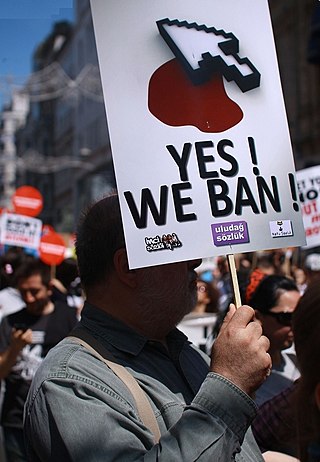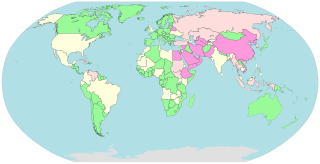Telecommunications in Ecuador include telephone, radio, television, and the Internet.
Nigeria is Africa's largest ICT market, accounting for 82% of the continent's telecoms subscribers and 29% of internet usage. Globally, Nigeria ranks 11th in the absolute number of internet users and 7th in the absolute number of mobile phones.
Mass media in Venezuela comprise the mass and niche news and information communications infrastructure of Venezuela. Thus, the media of Venezuela consist of several different types of communications media: television, radio, newspapers, magazines, cinema, and Internet-based news outlets and websites. Venezuela also has a strong music industry and arts scene.
Internet censorship in Australia is enforced by both the country's criminal law as well as voluntarily enacted by internet service providers. The Australian Communications and Media Authority (ACMA) has the power to enforce content restrictions on Internet content hosted within Australia, and maintain a blocklist of overseas websites which is then provided for use in filtering software. The restrictions focus primarily on child pornography, sexual violence, and other illegal activities, compiled as a result of a consumer complaints process.

Internet censorship in Pakistan is government control of information sent and received using the Internet in Pakistan. There have been significant instances of website access restriction in Pakistan, most notably when YouTube was banned/blocked from 2012 to 2016. Pakistan has asked a number of social media organisations to set up local offices within the country, but this is yet to happen.

Internet censorship in India is done by both central and state governments. DNS filtering and educating service users in suggested usages is an active strategy and government policy to regulate and block access to Internet content on a large scale. Measures for removing content at the request of content creators through court orders have also become more common in recent years. Initiating a mass surveillance government project like Golden Shield Project is an alternative that has been discussed over the years by government bodies.

The Internet in Myanmar has been available since 2000 when the first Internet connections were established. Beginning in September 2011, historically-pervasive levels of Internet censorship in Burma were significantly reduced. Prior to September 2011, the military government worked aggressively to limit and control Internet access through software-based censorship, infrastructure and technical constraints, and laws and regulations with large fines and lengthy prison sentences for violators. In 2015, internet usage significantly increased to 12.6% with the introduction of faster mobile 3G internet by transnational telecommunication companies Telenor Myanmar and Ooredoo Myanmar, later joined by national Myanmar Post and Telecommunications(MPT). While the Internet situation in Myanmar has undergone change since its introduction in 2010 and reduction of censorship in 2011, laws such as the 2013 Telecommunications Law continue to restrict citizens from total freedom online. Despite restrictions, internet penetration continues to grow across the country.

Censorship in Turkey is regulated by domestic and international legislation, the latter taking precedence over domestic law, according to Article 90 of the Constitution of Turkey.
Internet censorship in the United States is the suppression of information published or viewed on the Internet in the United States. The First Amendment of the United States Constitution protects freedom of speech and expression against federal, state, and local government censorship.
Most Internet censorship in Thailand prior to the September 2006 military coup d'état was focused on blocking pornographic websites. The following years have seen a constant stream of sometimes violent protests, regional unrest, emergency decrees, a new cybercrimes law, and an updated Internal Security Act. Year by year Internet censorship has grown, with its focus shifting to lèse majesté, national security, and political issues. By 2010, estimates put the number of websites blocked at over 110,000. In December 2011, a dedicated government operation, the Cyber Security Operation Center, was opened. Between its opening and March 2014, the Center told ISPs to block 22,599 URLs.
The Internet is accessible to the majority of the population in Egypt, whether via smartphones, internet cafes, or home connections. Broadband Internet access via VDSL is widely available.
Use of the Internet in Venezuela has greatly expanded, but is mostly concentrated among younger, educated city residents, and centered on the capital, Caracas. The Venezuelan economic crisis caused a prolonged period where Venezuelan had among the lowest speeds in the region, which has been drastically improving starting in 2022. It currently stands at 16% of the median regional speed, but with several private companies overtaking the local market from the state company CANTV with fiber optic connections that average between 100 Mbps and 300 Mbps like Netuno, Fibex, Inter and Thundernet.
Internet in Azerbaijan is vulnerable to government monitoring and censorship. The ruling Aliyev family owns two of the three largest mobile operators in Azerbaijan. The ownership of the third large mobile operator is unknown, as it registered to an offshore company. The authoritarian regime in Azerbaijan has a history of blocking websites that criticize the government.

The Federal Service for Supervision of Communications, Information Technology and Mass Media, abbreviated as Roskomnadzor (RKN), is the Russian federal executive agency responsible for monitoring, controlling and censoring Russian mass media. Its areas of responsibility include electronic media, mass communications, information technology and telecommunications, supervising compliance with the law, protecting the confidentiality of personal data being processed, and organizing the work of the radio-frequency service.

Censorship in Venezuela refers to all actions which can be considered as suppression in speech in the country. More recently, Reporters Without Borders ranked Venezuela 159th out of 180 countries in its World Press Freedom Index 2023 and classified Venezuela's freedom of information in the "very difficult situation" level.

Censorship of Twitter refers to Internet censorship by governments that block access to Twitter. Twitter censorship also includes governmental notice and take down requests to Twitter, which it enforces in accordance with its Terms of Service when a government or authority submits a valid removal request to Twitter indicating that specific content published on the platform is illegal in their jurisdiction.

Internet censorship in South Korea is prevalent, and contains some unique elements such as the blocking of pro-North Korea websites, and to a lesser extent, Japanese websites, which led to it being categorized as "pervasive" in the conflict/security area by OpenNet Initiative. South Korea is also one of the few developed countries where pornography is largely illegal, with the exception of social media websites which are a common source of legal pornography in the country. Any and all material deemed "harmful" or subversive by the state is censored. The country also has a "cyber defamation law", which allow the police to crack down on comments deemed "hateful" without any reports from victims, with citizens being sentenced for such offenses.
GitHub has been the target of censorship from governments using methods ranging from local Internet service provider blocks, intermediary blocking using methods such as DNS hijacking and man-in-the-middle attacks, and denial-of-service attacks on GitHub's servers from countries including China, India, Iraq, Russia, and Turkey. In all of these cases, GitHub has been eventually unblocked after backlash from users and technology businesses or compliance from GitHub.
There has been censorship and media control during Venezuelan presidential crisis between 2019 and January 2023.

This list of Internet censorship and surveillance in the Americas provides information on the types and levels of Internet censorship and surveillance that is occurring in countries in the Americas.









